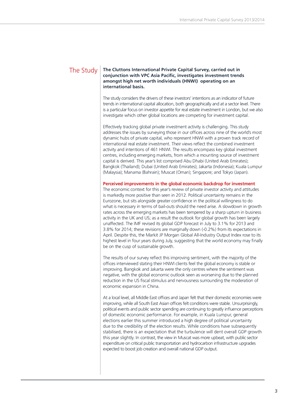
International Private Capital Survey 2013/2014
The Study The Cluttons International Private Capital Survey, carried out in
conjunction with VPC Asia Pacific, investigates investment trends
amongst high net worth individuals (HNWI) operating on an
international basis.
The study considers the drivers of these investors’ intentions as an indicator of future
trends in international capital allocation, both geographically and at a sector level. There
is a particular focus on investor appetite for real estate investment in London, but we also
investigate which other global locations are competing for investment capital.
Effectively tracking global private investment activity is challenging. This study
addresses the issues by surveying those in our offices across nine of the world’s most
dynamic hubs of private capital, who represent HNWI with a proven track record of
international real estate investment. Their views reflect the combined investment
activity and intentions of 461 HNWI. The results encompass key global investment
centres, including emerging markets, from which a mounting source of investment
capital is derived. This year’s list comprised Abu Dhabi (United Arab Emirates);
Bangkok (Thailand); Dubai (United Arab Emirates); Jakarta (Indonesia); Kuala Lumpur
(Malaysia); Manama (Bahrain); Muscat (Oman); Singapore; and Tokyo (Japan).
Perceived improvements in the global economic backdrop for investment
The economic context for this year’s review of private investor activity and attitudes
is markedly more positive than seen in 2012. Political uncertainty remains in the
Eurozone, but sits alongside greater confidence in the political willingness to do
what is necessary in terms of bail-outs should the need arise. A slowdown in growth
rates across the emerging markets has been tempered by a sharp upturn in business
activity in the UK and US; as a result the outlook for global growth has been largely
unaffected. The IMF revised its global GDP forecast in July to 3.1% for 2013 and
3.8% for 2014; these revisions are marginally down (-0.2%) from its expectations in
April. Despite this, the Markit JP Morgan Global All-Industry Output Index rose to its
highest level in four years during July, suggesting that the world economy may finally
be on the cusp of sustainable growth.
The results of our survey reflect this improving sentiment, with the majority of the
offices interviewed stating their HNWI clients feel the global economy is stable or
improving. Bangkok and Jakarta were the only centres where the sentiment was
negative, with the global economic outlook seen as worsening due to the planned
reduction in the US fiscal stimulus and nervousness surrounding the moderation of
economic expansion in China.
At a local level, all Middle East offices and Japan felt that their domestic economies were
improving, while all South East Asian offices felt conditions were stable. Unsurprisingly,
political events and public sector spending are continuing to greatly influence perceptions
of domestic economic performance. For example, in Kuala Lumpur, general
elections earlier this summer introduced a high degree of political uncertainty
due to the credibility of the election results. While conditions have subsequently
stabilised, there is an expectation that the turbulence will dent overall GDP growth
this year slightly. In contrast, the view in Muscat was more upbeat, with public sector
expenditure on critical public transportation and hydrocarbon infrastructure upgrades
expected to boost job creation and overall national GDP output.
3